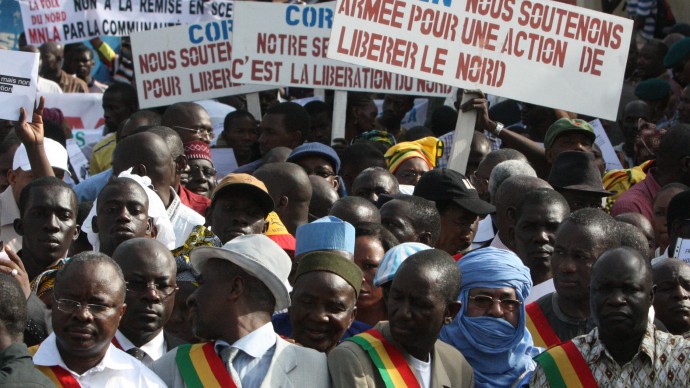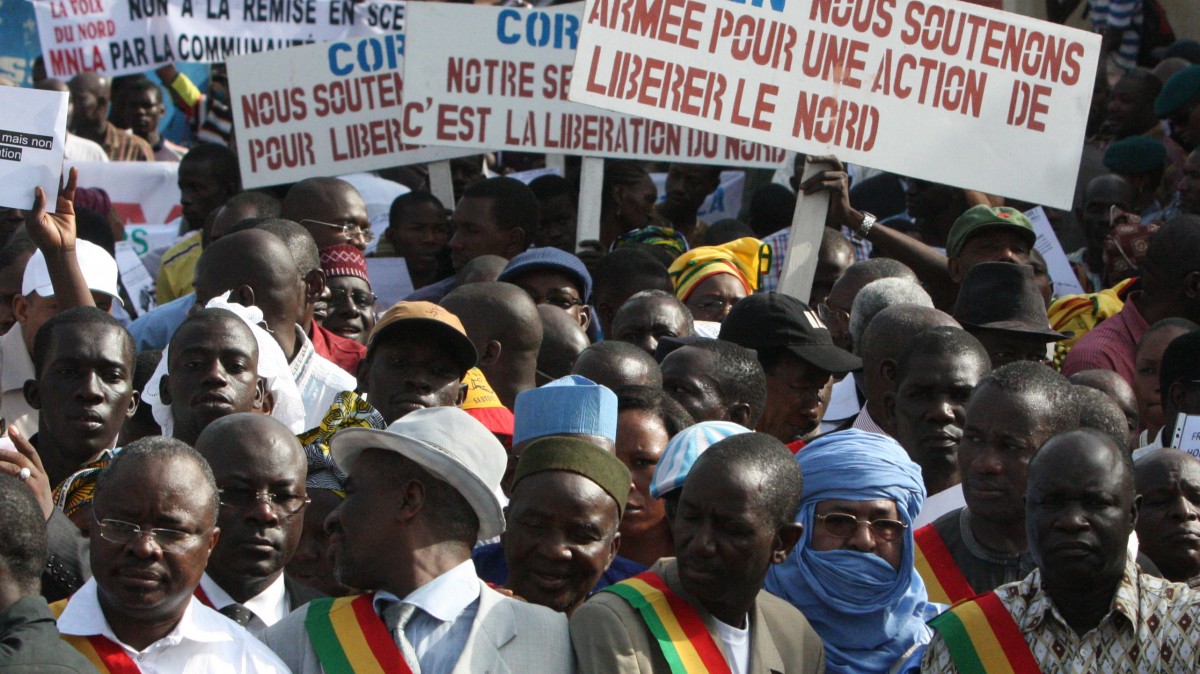
(NAMIBIA) MintPress – Fears are mounting that a drone campaign in the Sahel may be drawing near as al-Qaida affiliates gain ground in the aftermath of the Arab Spring and a Tuareg rebellion in Mali earlier this year.
The growing influence of al-Qaida in the Islamic Maghreb (AQIM) on the Sahel countries of Mauritania, Mali, Niger and Chad, has many onlookers wondering when exactly the drone campaigns will begin.
A recent article in the Wall Street Journal reported that the lack of guaranteed support from the local population and “the generally flat terrain of the areas of operation, suggest that an aggressive Pakistan-style drone campaign can have results.”
France has already announced a plan to send reconnaissance drones into the region, and the Economic Community of West African States (ECOWAS) is seeking a U.N. Security Council mandate for immediate intervention in Mali, which would be ready as early as 2013.
Just last year, Mali was viewed as a relatively open and stable state under the rule of President Amadou Toumani Touré. Today, Tuareg rebels control two-thirds of the country while radical Islamic groups capitalize on the mounting political unrest.
Tracing the roots of Islamic extremism in Africa
AQIM emerged from the Algerian civil war that broke out in 1992, when the army prevented a democratically-elected Islamic party from taking control of the country. Infighting among Islamic extremist groups in Algeria culminated in the founding of AQIM in 2007, marking the group’s affiliation with the strategy and tactics of global jihad.
While AQIM relies on just a few hundred members, the group is nevertheless exploiting the power vacuums in the Algerian Sahara and Sahel regions where it is establishing a significant presence in Mali, Mauritania and Niger. The process of “Sahelization” is accelerated in part due to the military repression of AQIM in Algeria and the growing instability of the Sahel.
The Italian research firm, Instituto Affari Internazionali (IAI), cites porous borders, a complex and unstable ethno-religious make-up, political instability, economic underdevelopment and high levels of corruption as contributing factors to the accelerated expansion of AQIM into the Sahel.
Yet, Mali has struggled with poverty, maladministration, corruption and under-development for several years. These factors alone do not explain the magnitude of AQIM’s expansion in Mali over the past year.
To understand how this once-stable democratic nation became a breeding ground for Islamic extremism in such a short period of time, one must look back to the Arab Spring.
Impact of the Arab Spring on the Sahel Region
The toppling of Moammar Gadhafi’s compound in August 2011 sent many powerful, armed Gadhafi supporters fleeing to the Sahel. Many ethnic Tuaregs from Mali, Niger, Algeria and Libya had been mercenaries for the Gadhafi regime for the benefits of better pay and living conditions.
According to Micha’el Tanchum of the Shalem Center in Jerusalem, “In early September, while Libya’s interim rulers met with world leaders in Paris to discuss Libya’s post-Gadhafi future, heavily armed convoys began crossing the southern Libyan desert into Niger carrying senior Tuareg officers from Gadhafi’s security forces, as well as Tuareg mercenaries.”
Back in Mali, ethnic Tuaregs teamed with AQIM and Malian al-Qaida affiliate Ansar Dine to stage a rebellion against the central government.
“The combustible mix of AQIM, Ansar Dine and Tuareg rebels is very complex and dangerous,” writes Bruce Riedel of the Saban Center for Middle East Policy at the Brookings Institution. “They are all very well armed thanks to looting Libyan arms depots after the fall of Gadhafi. AQIM has acquired weapons from Libyan caches that probably make it the best-armed al-Qaida franchise in the world today.”
Rebels succeeded in the overthrow of former President Touré in March, and Tuareg rebels took advantage of the ensuing power vacuum to claim Azawad an independent state in northern Mali. The international community has refused to recognize their independence.
Many of the temporary agreements between Salafist movement Ansar Dine and ethnic Tuaregs fell apart by mid-summer. Since the rebellion, it is believed the Tuaregs have lost significant portions of land to Ansar Dine.
Ansar Dine capitalized on the strengths, training and weapons of the Tuaregs returning to Libya to weaken the central government and take control. According to Riedel, AQIM and Ansar Dine “swept out government forces from the north of Mali, then turned on a Tuareg independence movement that initially had been their partner and now control a vast Saharan stronghold the size of France.”
Linking Boko Haram to AQIM
Not only has the Tuareg rebellion provided inroads for AQIM into Mali, but the political unrest has also provided a potential gateway for the northward expansion of Nigeria’s Islamic jihadist group, Boko Haram.
“The outbreak of a Tuareg separatist rebellion in Mali in January 2012, which now has swept across two-thirds of the country, carries the potential of linking North Africa’s al-Qaida in the Islamic Maghreb (AQIM) via Mali and Niger, to Nigeria’s Boko Haram to form a nexus of Salafi jihadist militancy across West Africa,” writes Tanchum.
AQIM has been strategically attempting to exploit ethnic Tuaregs by shifting Tuareg identities from Sufi-inspired Islam mixed with Berber traditions toward a more orthodox, trans-ethnic Salafi interpretation of the faith.
“The intensification of Salafi Islamist sympathies among the Tuareg would allow AQIM to penetrate further south and form a contiguous area of jihadist militancy with Boko Haram that would encompass most of West Africa,” added Tanchum.
Al-Qaida affiliate Boko Haram emerged in Nigeria immediately following the 9/11 attacks, when long-standing intra-Muslim and Muslim-Christian conflicts re-emerged locally within the framework of global jihad. The group has slowly been replacing the values of local African Muslim traditions with the Salafi values of groups like the Taliban and Somalia’s Al-Shabaab.
The base of support for Boko Haram comes from the Kanuri region of Northeastern Nigeria, Northern Cameroon, Southeastern Niger and Southwestern Chad; Niger provides a northern route for Boko Haram into Mali, southern Libya and Algeria.
The Tuareg rebellion has created a prime breeding ground for Islamic extremism; without some form of international intervention, stakeholders fear that AQIM in Algeria will converge with Boko Haram in Nigeria to create the largest al-Qaida-affiliated Islamic stronghold in Africa.
“Today, AQIM is the fastest-growing al-Qaida franchise in the world,” writes Riedel. “Previous lessons from Afghanistan, Iraq and elsewhere are clear: once al-Qaida establishes a presence in a failing state, it becomes very difficult to root it out entirely,” he adds.
Consequences of striking too soon
West African leaders met in Nigeria’s capital earlier this month to finalize a blueprint for military intervention in Mali that will eventually be sent to the U.N. Security Council for final approval.
French President François Hollande strongly supports the idea of military intervention in Mali, telling a U.N. General Assembly meeting earlier this fall, “We have to act, act together and act quickly, because it is urgently needed.”
U.S. Secretary of State Hillary Clinton affirmed Hollande’s call to action, saying, “Mali’s security forces need help, and African-led interventions in Somalia and Ivory Coast were successful.” Clinton added, “We all know too well what is happening in Mali, and the incredible danger posed by violent extremists imposing their brutal ideology, committing human rights abuses, destroying irreplaceable cultural heritage.”
While Clinton may support an African-led military intervention in Mali, the United States may wish to think twice before getting too involved. A Pakistan-style drone campaign in Mali has the potential to create a negative backlash among civilians as has been seen in Yemen and Southwest Asia.
The Oxford Research Group warns that military intervention may be used as a propaganda tool for Islamic extremists. “From the point of view of the leadership of AQIM in North Africa, and Boko Haram in Nigeria, military intervention would actually be welcome as further evidence of external interference, in particular if there was French and U.S. involvement,” the Oxford Research Group reported earlier this year in a report on the risk of intervention in Mali.
The report cautions military intervention, stating that any escalation would be expected to increase support for Islamic extremist groups, “especially if an early phase of the military support included a reliance on armed drones and Special Forces.”
According to the report, “One of the main lessons of the experience in Afghanistan and Iraq over the past eleven years has been the manner in which events in one region have far greater and more rapid impacts in other areas than even a few decades ago…it means that any attempt to impose a military solution in northern Mali should be expected to have a wide impact, not just across northern Africa, but even in the Middle East and beyond.”
Islamic militants in Mali have already begun taking precautionary steps in case of military intervention by moving from the open desert into villages, towns and cities across the region. Militants have also begun recruiting child soldiers and economically disadvantaged locals to fight on their side.
The Guardian reported last week that Islamic extremists in Mali have also begun dispersing weapons stockpiles and planting anti-personnel mines in preparation for drone and aircraft attacks.
While the majority of residents in Mali do not support Islamic militants, they will also not support military intervention that will kill innocent civilians and children as has been seen already in Pakistan and Yemen.
The threat of an Islamic jihadist stronghold in Mali is imminent, and negotiations must remain at the forefront of efforts to address political instability and prevent the spread of AQIM further into the Sahel.
The Oxford Research Group emphasizes the negotiations “must be undertaken while recognizing that the relative underdevelopment in northern Mali and the marginalization of the Tuareg people and other groups must be addressed.”
While negotiations alone will not resolve the threat of Islamic extremism and internal conflict, the report suggests that an emphasis on negotiations between Tuaregs and the central government will help buy time and avoid military action until a long-term solution may be found.


